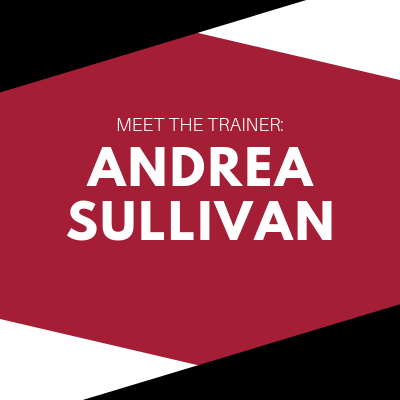Andrea Sullivan is a long-time member of University College’s Non-Credit teaching faculty, and leads many of our corporate training sessions. Find out more about what a training session with Andrea is like.
How long have you been leading corporate training sessions for Temple, and what kinds of courses do you teach?
I’ve been leading training sessions for Temple for about 17 years. I design and facilitate three of the courses in the Project Management Certificate Program, three of the courses in the Leadership & Management Certificate Program, and occasionally do some freestanding workshops on specific leadership, management, and personal mastery topics.
What are your favorite topics to teach, and why?
I actually really like all of the above. I’m quite passionate about people learning to optimize their performance, whether it’s managing projects or managing people or even managing themselves. I feel we all have a tremendous capacity for high performance; we really enjoy it when we’re working at our best; and the good news is that it can be learned! So I like to spread the joy!
Part of my background and education is in neuroscience and in the personal growth field, and I love applying these principles to our lives at work. It’s so helpful – when managing projects, the mainstream PMI framework we teach works really well with how our brains work; and when managing people, psychology and sociology are all important for us enhance our personal and interpersonal skills.
What’s the atmosphere like in your classes?
My classes are very informal, relaxed, interactive, and fun! Atmosphere is essential for learning, and fortunately all the current research shows that we learn best when we’re relaxed and having a good time. In addition, I feel it’s vital that learning be actualized and applicable to the workplace, so there are many exercises and processes where students apply concepts and skills to their own work. I don’t lecture a lot – I much prefer that students discover and work with the material themselves, and that is how learning is best solidified.
Tell us about a memorable teaching moment.
There’s one that stands out: November 8, 2016, the day after Donald Trump was elected president. I was teaching a project management class. As students came into class, I noticed that many were in shock, as I was. It was such a surprise event; such a huge event – regardless of which side of the politics people were on. I couldn’t imagine going right into project management with a room full of people so preoccupied. So we discussed it – in relation to leadership, emotional intelligence, adaptability, and resilience: What do you do when the world throws something unexpected at you, your team, and your project? It took about half an hour, and the conversation itself was illustrative: we were now ready to put our full attention on our work.
Why do you think professional education is so important?
An academic education takes us only so far when it comes to our career growth. The nature of our jobs changes; indeed, the nature of work is changing rapidly as technology and cultural innovations bring continuous, ongoing change to the workplace. It is essential to learn those skills that enable and empower you to grow professionally in the direction in which you choose to go as you advance your career. And particularly for those who wish to move into management or leadership roles: the shift from doing work to managing people is profound and requires many new competencies. The good news is that these skills can be learned, and they make a world of difference in both your effectiveness at work and the joy you find in doing it.
What do you do when you’re not leading corporate training sessions for Temple?
I do leadership and management trainings for both corporate and nonprofit organizations. In addition, I do personal growth seminars to work with people on creating the results they desire in their lives. As a part of my work, I’m always researching a variety of human development related fields to keep up with current understandings of who we are as human beings and how we can lead happy, productive, meaningful lives.

